Residents welcome normal hustle and bustle as China’s top two cities reemerge from epidemic cautiously but steadily
www.globaltimes.cn
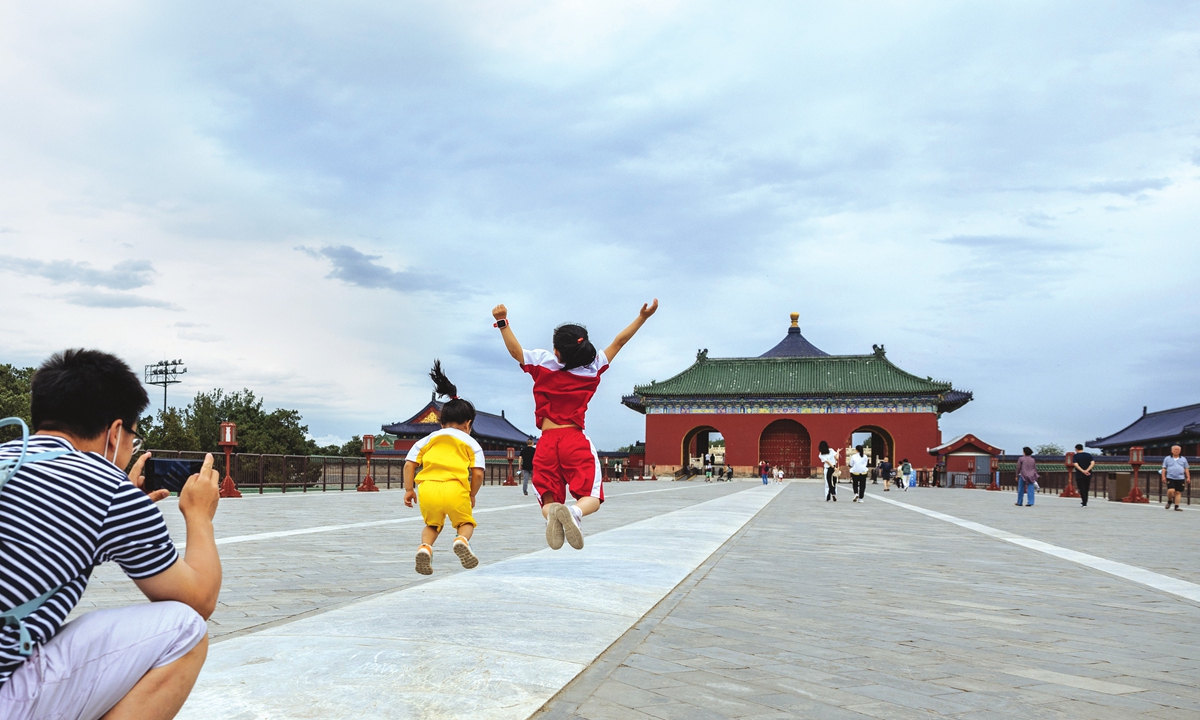 A father takes photos of his children at the Temple of Heaven on May 29, 2022. Photo: Li Hao/GT
A father takes photos of his children at the Temple of Heaven on May 29, 2022. Photo: Li Hao/GT
A reward for the perseverance of residents in China's two biggest cities during the hard battle against Omicron, there is finally a bright light at the end of the tunnel.
Starting from June 1, Shanghai will open residential communities, fully resume public transport operations, and allow vehicles on roads, ending the static management put in place since the end of March.
This financial hub is not alone to see anti-epidemic victory ahead of the Dragon Boat Festival holidays set in early June. With the number of daily confirmed new cases having dropped to single digits in Shanghai and 18 in Beijing, the two cities are gradually driving Omicron away, speeding up the return to normal life for the tens of millions of residents.
Although there has not been an immediate return to the usual hustle and bustle, many people in Beijing and Shanghai are already excited about starting to consider their Dragon Boat Festival holiday plans, returning to pre-epidemic routines: free movement to and from one's compound, being able to enjoy public transport, buying zongzi at reopened time-honored snack shops, breaking a sweat and shaping the body again at the gym, or tearfully watching a movie in the cinemas.
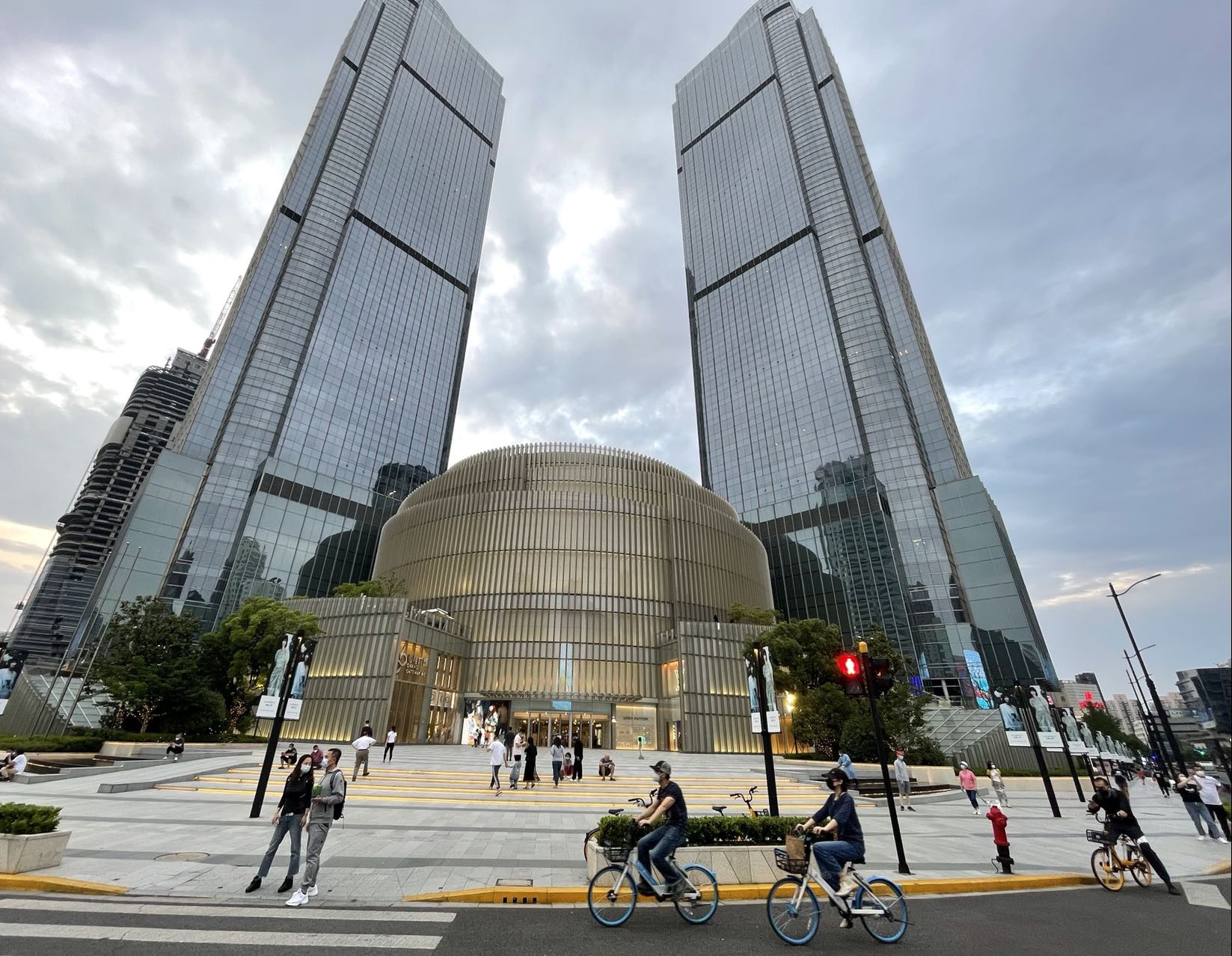 A view of Hang Lung Plaza in Shanghai on May 30. Photo: Feng Yu/GT
A view of Hang Lung Plaza in Shanghai on May 30. Photo: Feng Yu/GT
When she saw the news that Shanghai would soon receive a city-wide easement, 47-year-old newspaper editor Xi Xi rushed out of her house to Xujiahui, one of the busiest shopping areas in Shanghai. Even though she hadn't wasted the four precious four hours a day she was allowed to go out in recent days, she still wants to feel the heartbeat of the city at a moment of great importance.
"Looking at the increasing number of vehicles and people on the streets, I feel that the city will soon be coming back to life," she said.
In Beijing, 1,220 kilometers away from Shanghai, the city is also alive and active again.
Since May 29, except for the temporary control zones, public transportation services such as buses, subways, and taxi operations all resumed in Chaoyang, Shunyi and Fangshan districts, the most severely affected areas in the city in the latest round of Omicron infection.
On May 30, residents in Chaoyang - the most populous district in Beijing and the first to implement a work-from-home order a month ago, amended its remote work proposal to in-office work.
During the morning rush hour of the first working day after the resumption of public transportation, Beijing subway operated in an orderly manner with a large increase in passenger traffic.
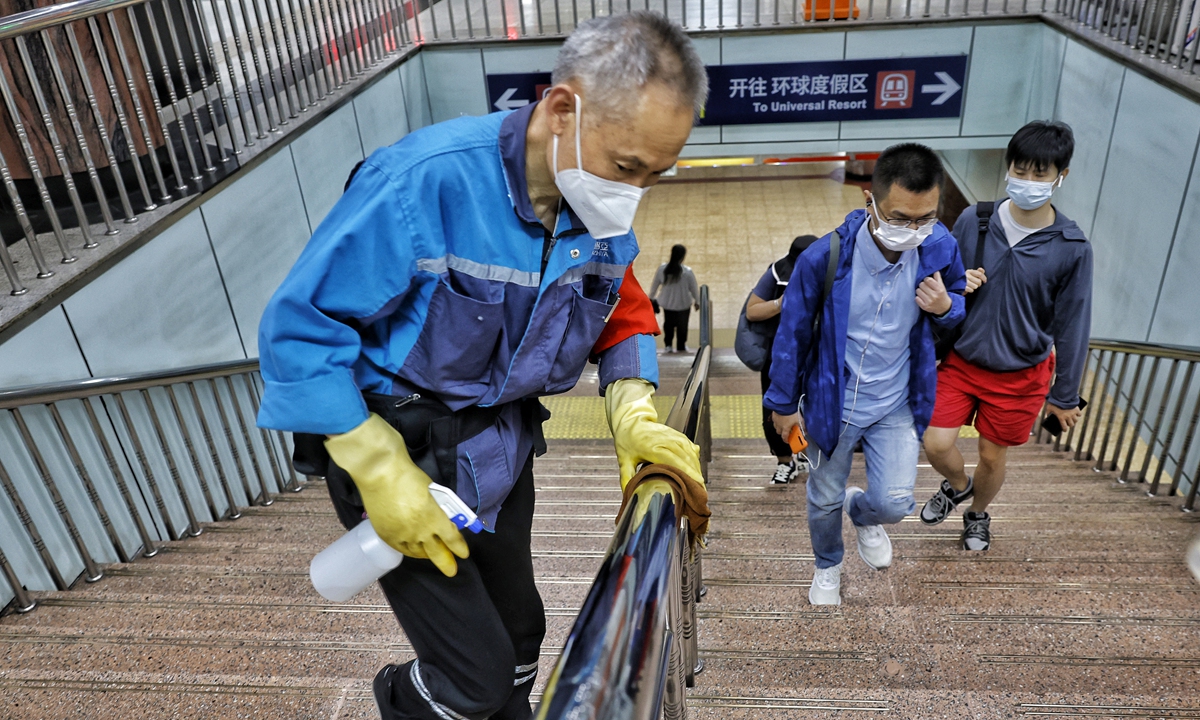 A worker disinfects handrails during morning rush hour at the Guomao subway station in Beijing on May 30. Photo: Li Hao/GT
A worker disinfects handrails during morning rush hour at the Guomao subway station in Beijing on May 30. Photo: Li Hao/GT
Major shopping malls in the capital also reopened over the weekend as customers eagerly and cautiously returned to grab a long-awaited cup of milk tea.
In addition to the parks such as the Beijing Wildlife Park, Chaoyang Park, and Olympic Forest Park which have been embracing the laughter of tourists since Sunday, the Badaling Wildlife World, the Ming Tombs, and the Juyongguan Great Wall section also reopened on May 30 to the public in accordance with the 50 percent restriction on visitor flow.
In Beijing, the restoration of city life and the epidemic prevention go hand in hand. "The barbershops are sterilized before every customer; grocery stores opened for residents to make orderly purchases, and nucleic acid testing sites have been added to the city in large numbers to guarantee regular testing among residents. The public is looking forward to the gradual, complete lifting of restriction, but also takes a cautious attitude toward the unpredictable virus," Zhang Qi, a COVID-19 epidemic prevention and control volunteer at Taiyanggong community of Chaoyang district, told the Global Times.
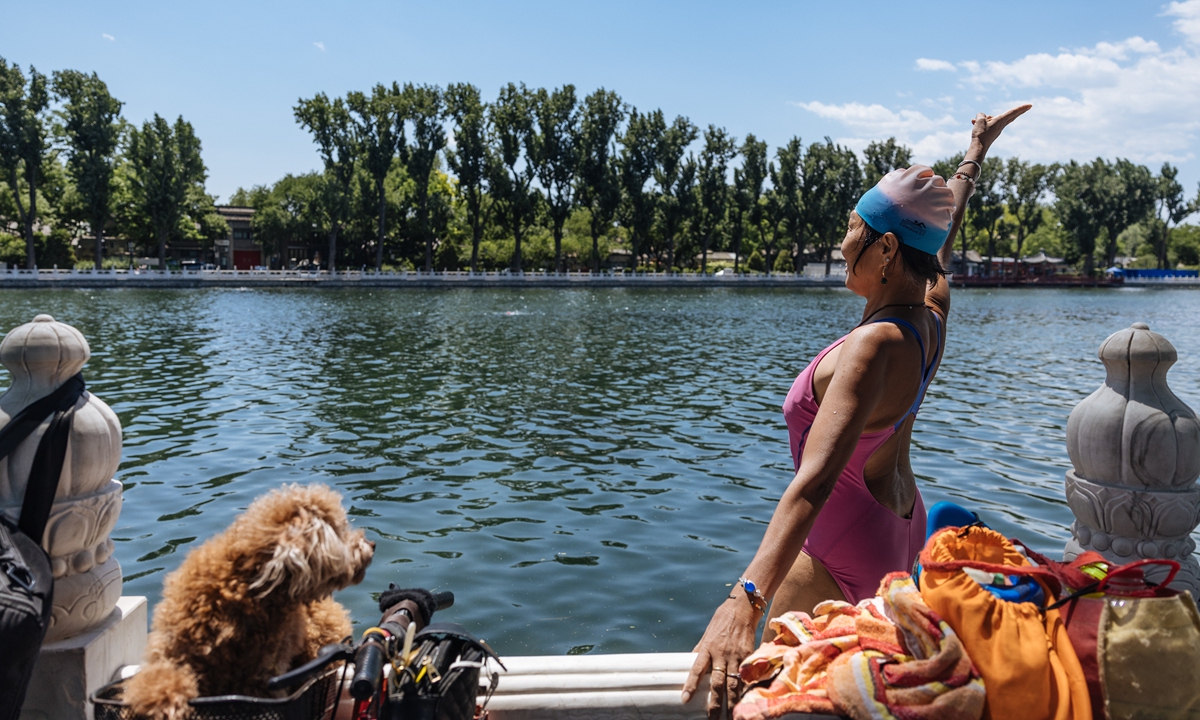 A woman swims in Houhai, Beijing on May 30. Photo: Li Hao/GT
A woman swims in Houhai, Beijing on May 30. Photo: Li Hao/GT
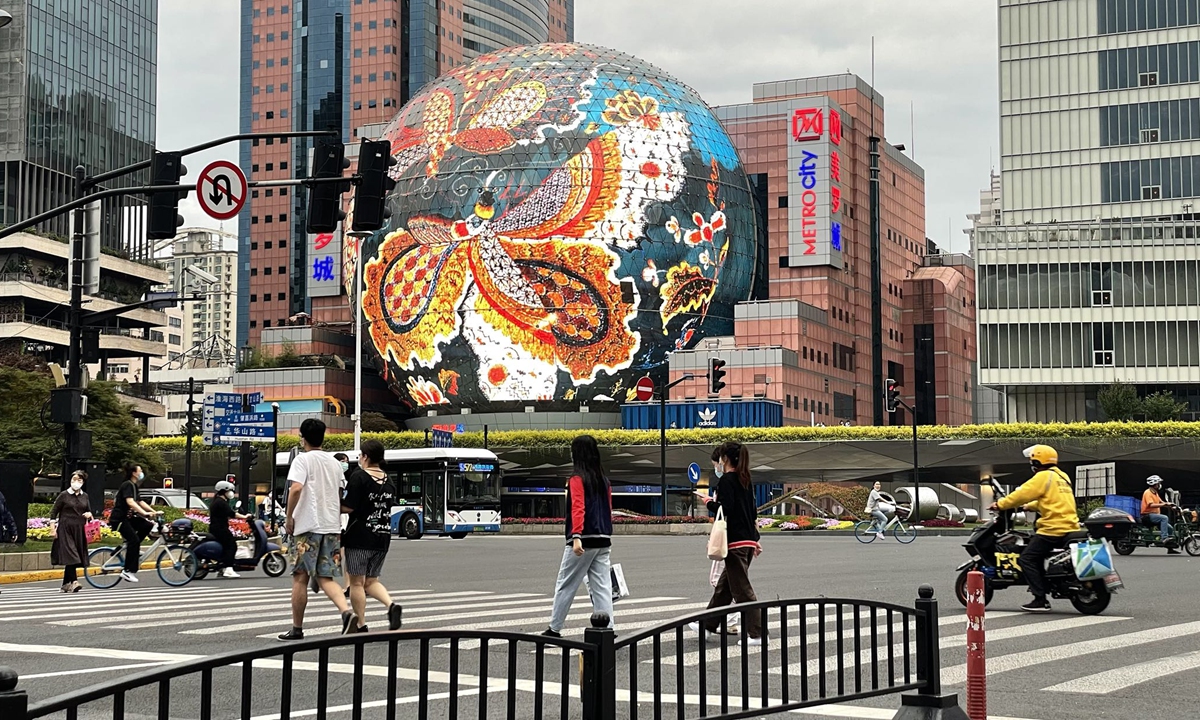 Pedestrians walk past Xujiahui Business district in Shanghai, on May 30. Photo: Feng Yu/GT
Pedestrians walk past Xujiahui Business district in Shanghai, on May 30. Photo: Feng Yu/GT
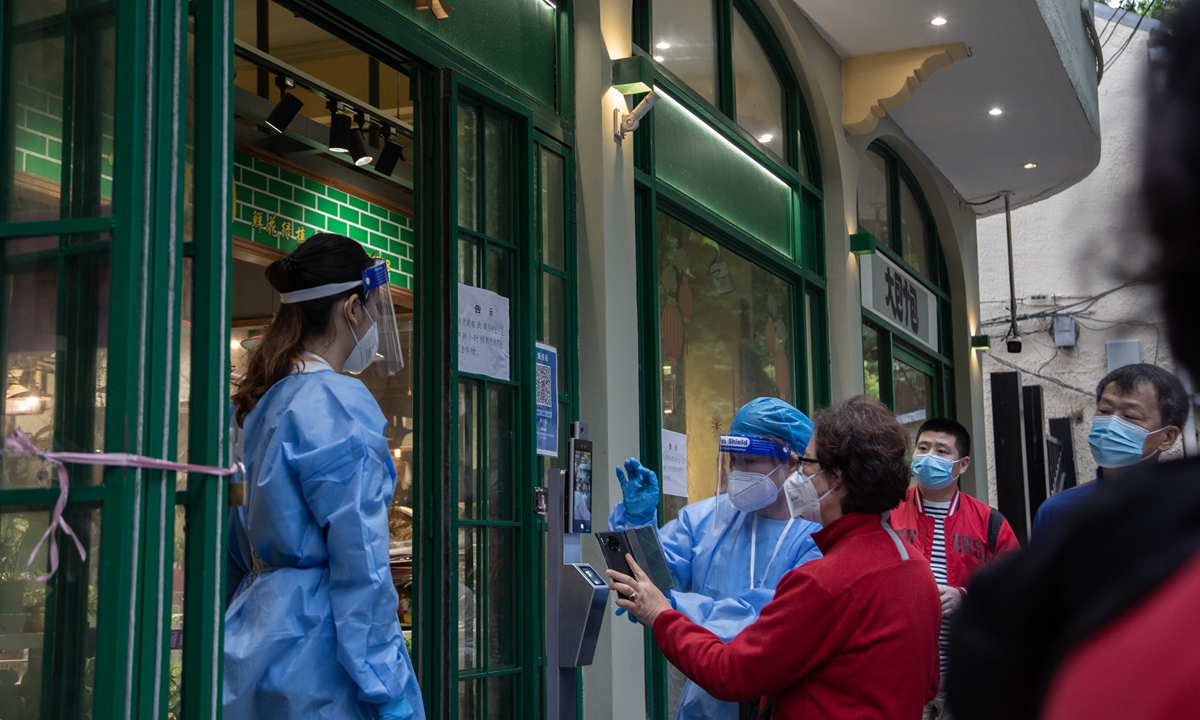 Shanghai residents scan the health code at the entrance of the Wuzhong Market. Photo: Wu Chuanhua/GT
Shanghai residents scan the health code at the entrance of the Wuzhong Market. Photo: Wu Chuanhua/GT
www.globaltimes.cn

A reward for the perseverance of residents in China's two biggest cities during the hard battle against Omicron, there is finally a bright light at the end of the tunnel.
Starting from June 1, Shanghai will open residential communities, fully resume public transport operations, and allow vehicles on roads, ending the static management put in place since the end of March.
This financial hub is not alone to see anti-epidemic victory ahead of the Dragon Boat Festival holidays set in early June. With the number of daily confirmed new cases having dropped to single digits in Shanghai and 18 in Beijing, the two cities are gradually driving Omicron away, speeding up the return to normal life for the tens of millions of residents.
Although there has not been an immediate return to the usual hustle and bustle, many people in Beijing and Shanghai are already excited about starting to consider their Dragon Boat Festival holiday plans, returning to pre-epidemic routines: free movement to and from one's compound, being able to enjoy public transport, buying zongzi at reopened time-honored snack shops, breaking a sweat and shaping the body again at the gym, or tearfully watching a movie in the cinemas.

When she saw the news that Shanghai would soon receive a city-wide easement, 47-year-old newspaper editor Xi Xi rushed out of her house to Xujiahui, one of the busiest shopping areas in Shanghai. Even though she hadn't wasted the four precious four hours a day she was allowed to go out in recent days, she still wants to feel the heartbeat of the city at a moment of great importance.
"Looking at the increasing number of vehicles and people on the streets, I feel that the city will soon be coming back to life," she said.
In Beijing, 1,220 kilometers away from Shanghai, the city is also alive and active again.
Since May 29, except for the temporary control zones, public transportation services such as buses, subways, and taxi operations all resumed in Chaoyang, Shunyi and Fangshan districts, the most severely affected areas in the city in the latest round of Omicron infection.
On May 30, residents in Chaoyang - the most populous district in Beijing and the first to implement a work-from-home order a month ago, amended its remote work proposal to in-office work.
During the morning rush hour of the first working day after the resumption of public transportation, Beijing subway operated in an orderly manner with a large increase in passenger traffic.

Major shopping malls in the capital also reopened over the weekend as customers eagerly and cautiously returned to grab a long-awaited cup of milk tea.
In addition to the parks such as the Beijing Wildlife Park, Chaoyang Park, and Olympic Forest Park which have been embracing the laughter of tourists since Sunday, the Badaling Wildlife World, the Ming Tombs, and the Juyongguan Great Wall section also reopened on May 30 to the public in accordance with the 50 percent restriction on visitor flow.
In Beijing, the restoration of city life and the epidemic prevention go hand in hand. "The barbershops are sterilized before every customer; grocery stores opened for residents to make orderly purchases, and nucleic acid testing sites have been added to the city in large numbers to guarantee regular testing among residents. The public is looking forward to the gradual, complete lifting of restriction, but also takes a cautious attitude toward the unpredictable virus," Zhang Qi, a COVID-19 epidemic prevention and control volunteer at Taiyanggong community of Chaoyang district, told the Global Times.



